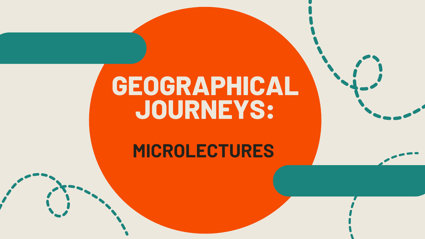
Guidance for speaker applications
Application
Please email london@rgs.org with the following details by 5.00pm on Monday 10 November 2025:
- Your name.
- Confirmation that you are over 16.
- Title of your talk.
- 200 word description of your talk.
- Contact phone number.
- Your resident country or UK region?
- Are you a current Fellow, Member or non-Member of the Society?
- How did you hear about the application?
- If we may (or may not) share your application with other areas of the Society, including our UK regional committees.
Following the deadline, all applicants will be contacted and those shortlisted will be invited to an online audition. The auditions are a supportive process with time for feedback and discussion.
Please apply in accordance with the below guidelines.
Eligibility
All applicants must be over 16 (there is no upper age limit). Applications may be from Members or Fellows of the Society, as well as non-members.
Those who have spoken at a microlectures event in the previous two years are not eligible to apply to speak.
Format of a ‘microlecture’
Speakers have a maximum of 10 minutes to give their talk accompanied by a visual presentation. After each talk there will be five minutes of questions from the audience before moving on to the next speaker.
The evening needs to keep to a tight schedule so timing is important.
Content – building your talk
- Remember, the title of the overall event is ‘geographical journeys’ so your talk should reflect this, focusing on a journey with a geographical purpose or theme, and displaying an ‘interest and enthusiasm for the world's peoples, places and environments’.
- Think of a captivating title for your talk.
- First-hand accounts of recent journeys are favoured over academic or historical content.
- Talks should not be a commercial pitch or an obvious endorsement. References to charity projects etc. as well as personal projects related to the subject are acceptable.
- Avoid a round-up of loosely related experiences. Focus on one story.
- Choose a strong title image. Aim for around 10-20 images, dependent on your pace. Your closing image may contain contact details, social media handles, and sponsor thanks if appropriate.
- Showing a map of your journey early on may be useful.
- Make sure your images tie in with your story, and edit them carefully.
- Avoid reading from notes word-for-word or from the slides (use your images as prompts if necessary or use cards with keywords).
- On the evening you and your talk title will be introduced by the host, so there is no need to say your name or explain what you will talk about – just start your talk straight away.
- Think about the structure of your talk. Identify the key points of your story and focus on these, rather than a range of smaller topics.
- Use the opportunity to engage with the audience. If there are any props which will help bring the story to life, feel free to bring them along (although please notify us in advance).
- Time and practice your lecture to make sure it doesn’t run over the allotted 10 minutes.
- Video material may be used to illustrate a section of your story. We strongly discourage the showing of film trailers, full story video summaries, and longer clips. We want you to recount your story. Video is best placed earlier on to avoid timing problems.
- Is there a conclusion to your story? Consider how you are going to round off your lecture.
- Keep it snappy and enjoy yourself – when you do, the audience will enjoy it too!
Auditions
All applicants will be contacted and those shortlisted will be invited to an online audition.
It would be to the applicant’s advantage to have their talk and slides in as good a shape as possible, but we do not expect the audition to be necessarily a final version of the applicant’s microlecture.
We will be looking for an engaging talk which is primarily an account of a personal experience, with insight into a particular area or aspect of geography. After your ‘run through’ you will be asked questions, as will happen on the night, and given feedback on content and presentation.
Following auditions, the committee organisers will meet to select the final line-up. In selecting speakers, the organisers will aim to put together a varied programme that will inform, inspire and entertain the audience with fresh stories about experiences of interesting places.
By agreeing to participate, successful speakers give permission for their name, the title of their presentation and their image illustrating the microlecture to be used in promotional material for the event.
This is not a formal members’ Monday night lecture. Despite taking place in the Ondaatje Theatre, it is an informal event and provides an opportunity for the audience to hear ‘snapshots’ of experiences from around the world from our members.
The audience will comprise a range of age groups, interests and expertise, from school pupils to experienced professionals. Some will be members of the Society and others will be the general public with enthusiasm and an interest in your topic.
Event timings
- 5.30pm - Speakers’ briefing and sound check.
- 6.00pm - Doors open to ticket holders and Map Room bar opens.
- 7.00pm - Introduction and three or four presentations.
- 8.00pm - Interval (Map Room bar/networking).
- 8.30pm - Three presentations.
- 9.30pm - End of presentations, informal networking in the Map Room bar.
- 10.30pm - Event ends.
Technical details
For the audition we use Zoom and Google Hangouts. For the event the presentations should be either a PowerPoint or Keynote file (PowerPoint preferred). Page set-up should be 16:9 format.
Archive recordings
It is recommended that you watch the previous microlectures.